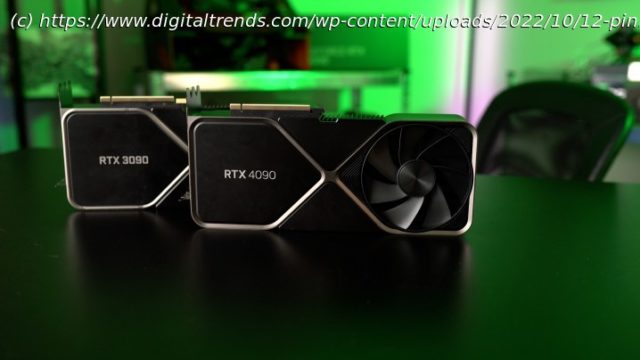If you have $1,600 just lying around, the RTX 4090 is a game-changing GPU. Most people don’t, which is where things get tricky for the RTX 4090.
The RTX 4090 is both a complete waste of money and the most powerful graphics card ever made. Admittedly, that makes it a difficult product to evaluate, especially considering how much the average PC gamer is looking to spend on an upgrade for their system.
Debuting Nvidia’s new Ada Lovelace architecture, the RTX 4090 has been shrouded in controversy and cited as the poster child for rising GPU prices. As much as it costs, it delivers on performance, especially with the enhancements provided by DLSS 3. Should you save your pennies and sell your car for this beast of GPU? Probably not. But it’s definitely an exciting showcase of how far this technology can really go.About this review
The RTX 4090 has been through a lot since it originally released. As we wind down the generation, we’re revisiting Nvidia’s flagship GPU to see how it holds up in 2024. Throughout the review, we’ve added additional notes on features, pitfalls, and pricing to better reflect the reality of buying the RTX 4090 in 2024.Video reviewNvidia RTX 4090 specs
As mentioned, the RTX 4090 introduces Nvidia’s new Ada Lovelace architecture, as well as chipmaker TSMC’s more efficient N4 manufacturing process. Although it’s impossible to compare the RTX 4090 spec-for-spec with the previous generation, we can glean some insights into what Nvidia prioritized when designing Ada Lovelace.
The main focus: clock speeds. The RTX 3090 Ti topped out at around 1.8GHz, but the RTX 4090 showcases the efficiency of the new node with a 2.52GHz boost clock. That’s with the same board power of 450 watts, but it’s running on more cores. The RTX 3090 Ti was just shy of 11,000 CUDA cores, while the RTX 4090 offers 16,384 CUDA cores.
It’s hard to say how much those extra cores matter, especially for gaming. Down the stack, the RTX 4080 has a little more than half of the cores as the RTX 4090, while the RTX 4070 Ti has even less.
Although the RTX 4090 kicked off the Ada Lovelace generation, Nvidia has filled out the stack since. We’ve reviewed every card from Nvidia’s current lineup, and you can find all of our review in the list below. Some cards, such as the RTX 4080 and RTX 4070 Ti, have been replaced with a refreshed Super model.Synthetic and rendering
Before getting into the full benchmark suite, let’s take a high-level look at performance. Port Royal and Time Spy from 3D Mark show how Nvidia’s latest flagship scales well, showing a 58% gain over the RTX 3090 Ti in Time Spy, as well as a 102% increase over the RTX 3090 in Port Royal.
It’s important to note that 3DMark isn’t the best way to judge performance, as it factors in your CPU much more than most games do (especially at 4K). In the case of the RTX 4090, though, 3DMark shows the scaling well. In fact, my results from real games are actually a little higher than what this synthetic benchmark suggests, at least outside of ray tracing.
I also tested Blender to gauge some content creation tasks with the RTX 4090, and the improvements are astounding. Blender is accelerated by Nvidia’s CUDA cores, and the RTX 4090 seems particularly optimized for these types of workloads, with it putting up more than double the score of the RTX 3090 and RTX 3090 Ti in the Monster and Junkshop scenes, and just under double in the Classroom scene. AMD’s GPUs, which don’t have CUDA, aren’t even close.4K gaming performance
On to the juicy bits. All of my tests were done with a Ryzen 9 7950X and 32GB of DDR5-6000 memory on an open-air test bench. I kept Resizeable BAR turned on throughout testing, or in the case of AMD GPUs, Smart Access Memory.
The RTX 4090 is a monster physically, but it’s also a monster when it comes to 4K gaming performance. Across my test suite, excluding Bright Memory Infinite and Horizon Zero Dawn, which I have incomplete data for, the RTX 4090 was 68% faster than the RTX 3090 Ti. Compared to the RTX 3090, you’re looking at nearly an 89% boost.
That’s a huge jump, much larger than the 30% boost we saw gen-on-gen with the release of the RTX 3080. And none of those numbers factor in upscaling. This is raw performance, including ray tracing, and the RTX 4090 is showing a huge lead over the previous generation.
Perhaps the most impressive showing was Cyberpunk 2077. The RTX 4090 is just over 50% faster than the RTX 3090 Ti at 4K with maxed-out settings, which is impressive enough. It’s the fact that the RTX 4090 cracks 60 frames per second (fps) that stands out, though. Even the most powerful graphics cards in the previous generation couldn’t get past 60 fps without assistance from Deep Learning Super Sampling (DLSS). The RTX 4090 can break that barrier while rendering every pixel, and do so with quite a lead.
Gears Tactics also shows the RTX 4090’s power, winning out over the RTX 3090 Ti with a 73% lead. In a Vulkan title like Red Dead Redemption 2, the gains are smaller, but the RTX 4090 still managed a 52% lead based on my testing. This is a huge generational leap in performance, though it’s still below what Nvidia originally promised.
Nvidia has marketed the RTX 4090 as “two to four times faster” than the RTX 3090 Ti, and that’s not true. It’s much faster than the previous top dog, but Nvidia’s claim only makes sense when you factor in DLSS 3. DLSS 3 is impressive, and I’ll get to it later in this review. But it’s not in every game and it still needs some work. Thankfully, with the RTX 4090’s raw performance, DLSS is more of a “nice to have” and less of a “need to have.”
In AMD-promoted titles like Assassin’s Creed Valhalla and Forza Horizon 5, the RTX 4090 still shows its power, though now against AMD’s RX 6950 XT. In Valhalla at 4K, the RTX 4090 managed a 63% lead over the RX 6950 XT. The margins were tighter in Forza Horizon 5, which seems to scale very well with AMD’s current offerings.






